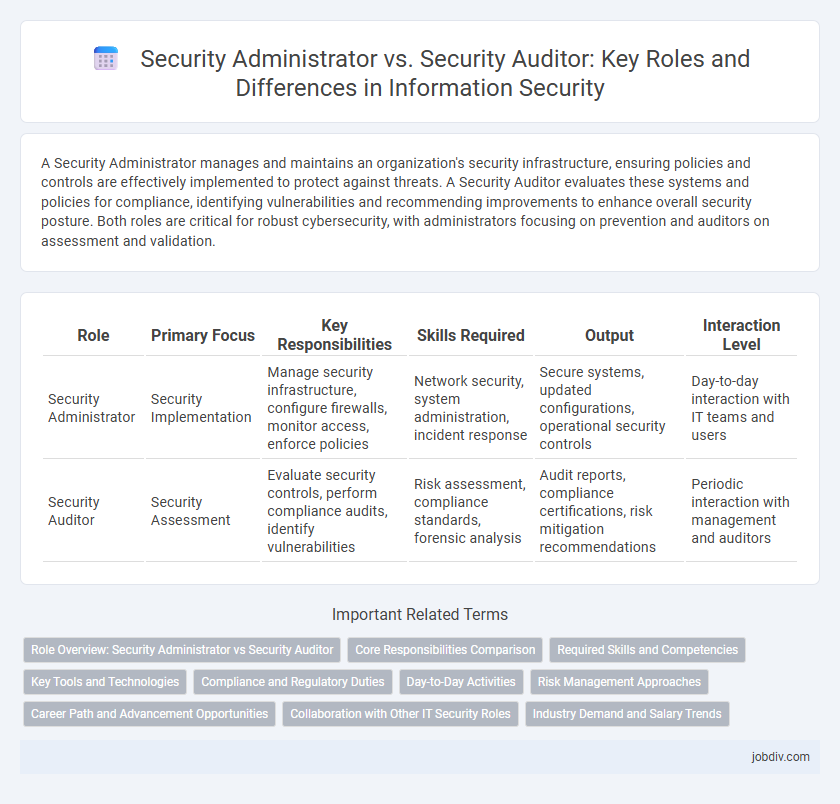A Security Administrator manages and maintains an organization's security infrastructure, ensuring policies and controls are effectively implemented to protect against threats. A Security Auditor evaluates these systems and policies for compliance, identifying vulnerabilities and recommending improvements to enhance overall security posture. Both roles are critical for robust cybersecurity, with administrators focusing on prevention and auditors on assessment and validation.
Table of Comparison
| Role | Primary Focus | Key Responsibilities | Skills Required | Output | Interaction Level |
|---|---|---|---|---|---|
| Security Administrator | Security Implementation | Manage security infrastructure, configure firewalls, monitor access, enforce policies | Network security, system administration, incident response | Secure systems, updated configurations, operational security controls | Day-to-day interaction with IT teams and users |
| Security Auditor | Security Assessment | Evaluate security controls, perform compliance audits, identify vulnerabilities | Risk assessment, compliance standards, forensic analysis | Audit reports, compliance certifications, risk mitigation recommendations | Periodic interaction with management and auditors |
Role Overview: Security Administrator vs Security Auditor
Security Administrators are responsible for implementing and managing an organization's security infrastructure, including firewalls, access controls, and intrusion detection systems, ensuring daily operational security. Security Auditors independently assess and evaluate security policies, procedures, and controls to ensure compliance with regulatory standards and identify vulnerabilities. While Security Administrators focus on active defense and system maintenance, Security Auditors emphasize risk assessment and validation of security effectiveness.
Core Responsibilities Comparison
Security Administrators manage and monitor an organization's security infrastructure, including firewalls, intrusion detection systems, and access controls to ensure continuous protection against threats. Security Auditors assess and evaluate the effectiveness of security policies, controls, and compliance with regulatory standards through systematic audits and risk assessments. While administrators focus on implementing and maintaining security measures, auditors concentrate on identifying vulnerabilities and verifying adherence to security frameworks such as ISO 27001 and NIST.
Required Skills and Competencies
Security Administrators require strong expertise in network management, firewall configuration, and intrusion detection systems to maintain and protect organizational assets. Security Auditors need proficiency in compliance frameworks, risk assessment methodologies, and detailed reporting to evaluate security policies effectively. Both roles demand knowledge of cybersecurity principles, incident response, and regulatory standards such as ISO 27001 and NIST.
Key Tools and Technologies
Security Administrators primarily utilize tools such as firewalls, intrusion detection systems (IDS), and endpoint protection platforms to safeguard network infrastructure and manage real-time threat responses. Security Auditors employ technologies like vulnerability scanners, compliance management software, and Security Information and Event Management (SIEM) systems to assess security controls, ensure regulatory adherence, and conduct systematic security evaluations. Both roles leverage encryption technologies and multi-factor authentication systems to enhance organizational security posture.
Compliance and Regulatory Duties
Security administrators implement and maintain security policies to ensure ongoing compliance with industry regulations such as HIPAA, GDPR, and PCI-DSS. Security auditors evaluate these implementations through structured assessments and audits, identifying gaps in adherence to compliance standards and regulatory requirements. Both roles are crucial for preventing breaches and ensuring that organizational security frameworks meet legal and regulatory obligations.
Day-to-Day Activities
Security Administrators manage and maintain an organization's security infrastructure by configuring firewalls, monitoring network traffic, and updating security protocols to protect against cyber threats. Security Auditors conduct regular assessments and compliance checks, reviewing access controls, policy adherence, and system vulnerabilities to ensure the effectiveness of security measures. Both roles are critical in an organization's cybersecurity framework, with Administrators focusing on real-time defense and Auditors on systematic evaluation and improvement.
Risk Management Approaches
Security Administrators implement proactive risk management by configuring firewalls, access controls, and monitoring systems to prevent threats and enforce organizational security policies. Security Auditors conduct comprehensive risk assessments by evaluating existing controls, identifying vulnerabilities, and ensuring compliance with regulatory standards to minimize potential security breaches. Both roles contribute to risk management by combining operational defense strategies with compliance oversight to strengthen overall cybersecurity posture.
Career Path and Advancement Opportunities
Security Administrators manage and maintain an organization's security infrastructure, focusing on implementing policies and safeguarding systems. Security Auditors evaluate the effectiveness of security measures, ensuring compliance with regulations and identifying vulnerabilities through thorough assessments. Career advancement for Security Administrators often leads to roles like Security Manager or Chief Information Security Officer (CISO), while Security Auditors may progress to senior audit roles or specialize as compliance officers and risk assessment experts.
Collaboration with Other IT Security Roles
Security Administrators collaborate closely with network engineers, system administrators, and incident response teams to implement and enforce security policies across infrastructure. Security Auditors work with compliance officers, risk managers, and IT security analysts to assess the effectiveness of security controls and ensure adherence to regulatory standards. Their joint efforts foster a comprehensive security posture by integrating operational management with strategic evaluation.
Industry Demand and Salary Trends
Security Administrators are in high demand for managing and maintaining organizational security infrastructure, with an average salary around $85,000 annually, reflecting steady growth due to increasing cyber threats. Security Auditors command salaries averaging $90,000, driven by demand for compliance verification and risk assessment expertise amid stringent regulatory requirements. Industry trends indicate expanding opportunities for both roles, but auditors often experience higher salary growth linked to specialized certifications and regulatory knowledge.
Security Administrator vs Security Auditor Infographic

 jobdiv.com
jobdiv.com